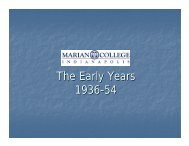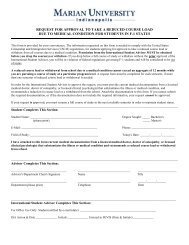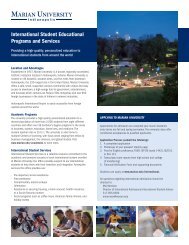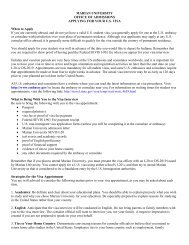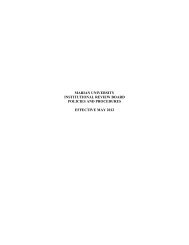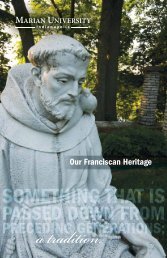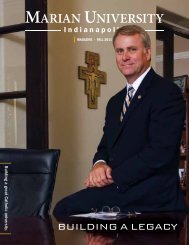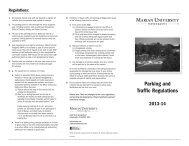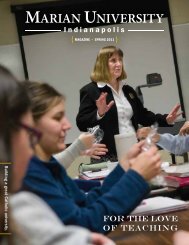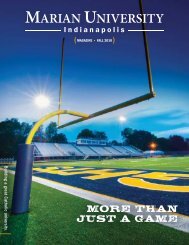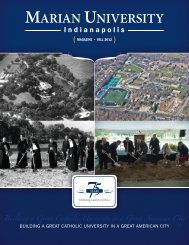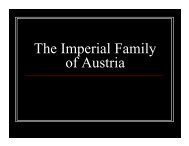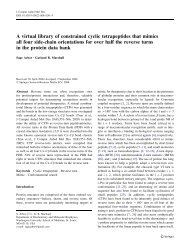2009-11 Marian University Course Catalog, fall 2010 edition
2009-11 Marian University Course Catalog, fall 2010 edition
2009-11 Marian University Course Catalog, fall 2010 edition
Create successful ePaper yourself
Turn your PDF publications into a flip-book with our unique Google optimized e-Paper software.
COM 201<br />
Communication for<br />
Intentional Communities 1 credit<br />
Prerequisites: Participation in the Dorothy Day House or the<br />
Peter Maurin House during the current semester. This course<br />
provides students in the Dorothy Day House and the Peter<br />
Maurin House with academic instruction in practical<br />
communication skills for living in an intentional community.<br />
Students explore topics such as community building, conflictresolution,<br />
consensus based decision making, and strategies<br />
for fostering open dialogue. The course also includes a<br />
dialogic forum for reflecting on the group’s mission and<br />
practice. Students may enroll in the course more than once.<br />
Graded S/U. (SEM)<br />
COM 203<br />
Forensics 2 credits<br />
Prerequisite: Participation in the <strong>Marian</strong> <strong>University</strong> Speech<br />
Team and travel to tournaments. In this enhancement course,<br />
students are provided with academic instruction in prepared,<br />
extemporaneous, and impromptu speaking as well as the oral<br />
interpretation of literature as they prepare for intercollegiate<br />
competition. This class is repeatable. (SEM)<br />
COM 210<br />
The Rhetorical Life 3 credits<br />
Prerequisite: 101. Rhetorical theory explores the many ways<br />
that words and symbols shape our view of the world.<br />
Unfolding the multifaceted dimensions of “the rhetorical<br />
life,” students explore the persuasive influence of language,<br />
knowledge, culture, and all socio-political action. Students<br />
will also evaluate the ethical implications of rhetorical texts<br />
from film and TV, political speeches and social movements,<br />
and interaction over the Internet. (FAL)<br />
COM 221<br />
The Art of Dialogue 3 credits<br />
Prerequisite: 101. The debate over controversial issues such<br />
as abortion, gay rights, and affirmative action is often so<br />
heated that communication breaks down. This course<br />
investigates the theory and practice of dialogue. Dialogue is a<br />
way of talking together when we vehemently disagree.<br />
Emphasizing skills for empathetic listening and managing<br />
conflict, the class will explore how dialogue can create shared<br />
understanding. (SPR)<br />
COM 223<br />
Argumentation and Debate 3 credits<br />
Prerequisite: 101. The course provides an introduction to<br />
argumentation theory grounded in the classroom experience<br />
of academic debate. Through stretching research skills,<br />
evaluating evidence, investigating informal logic, and<br />
performing the refutation of claims, this course provides a<br />
comprehensive overview of making and questioning<br />
arguments. (2FO)<br />
COM 235<br />
Oral Interpretation of Literature 3 credits<br />
Prerequisite: COM 101. Students select, analyze, rehearse,<br />
and perform a variety of texts such as prose, poetry, and<br />
dramatic literature. The course teaches vocal and physical<br />
techniques for communicating literature as well as theoretical<br />
perspectives that inform interpretation and performance.<br />
Cross-listed as THE 235. (ADD)<br />
COM 310<br />
Rhetorical Criticism 3 credits<br />
Prerequisite: 210. Investigating metaphor, narrative,<br />
ideology, and other rhetorical dynamics, the course surveys<br />
methods for analyzing rhetorical texts. Significant<br />
contemporary texts of public and popular culture are studied<br />
to exemplify critical principles. Critiquing various persuasive<br />
messages, students will turn the tools of rhetorical criticism<br />
to engaged social criticism. (2SE)<br />
COM 330<br />
Speech Writing 3 credits<br />
Prerequisite: 101. This course introduces students to the<br />
methods and techniques of effective speech writing. As they<br />
practice writing for the ear, students will exercise various<br />
rhetorical devices, sentence patterns, and organizational<br />
strategies. Students will also analyze exemplary speeches in<br />
religious, political, and ceremonial contexts. A practicecentered<br />
workshop, the course includes revising speeches as<br />
a part of a team, speeches that will often be performed by<br />
someone else. (2FE)<br />
COM 351<br />
Civil Religion in America 3 credits<br />
Prerequisite: Junior standing. Civil religion refers to the<br />
complex web of myths, rituals, and beliefs about the sacred<br />
that are reflected in public discourse. This class examines the<br />
role of religious language in public advocacy. Students<br />
investigate topics such as the roots of American civil religion<br />
in Judeo-Christian traditions, the relationship between civil<br />
religion and American identity, and the challenge of<br />
respecting religious pluralism in public debate. (ADD)<br />
COM 352<br />
Popular Culture and Postmodernity 3 credits<br />
Prerequisite: Junior standing. This course explores the<br />
seemingly chaotic cultural production, performance, and<br />
fragmentation of identities associated with race and<br />
ethnicity, gender and sex. Students critically assess the<br />
framing of identity in texts ranging from clothing<br />
advertisements to reality TV to Internet dating services. The<br />
politics of multiculturalism in a consumer society are<br />
explored as a vehicle for questioning what it means to<br />
describe American culture as postmodern. (ADD)<br />
84



